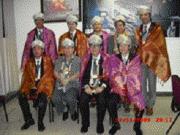Japan & India union reaches out to build better Labour Management

A seminar to look into the Japanese Management Relations model was held in Bangalore attended by 36 participants from all over India.
Looking at the Japanese system, our Indian colleagues had the opportunity to see the different type of systems and structures of trade union models in Japan. Amongst the discussion were on the issues affecting the Indian trade unions and to see how other countries or trade unions in particularly that in Japan were able to overcome some of these challenges.
Christopher Ng, Regional Secretary of UNI Apro commented on the initiative of UNI LCJ and UNI ILC to hold this type of seminar which would be very important to extend the solidarity and the need for the unions to share information to strengthen the union movement.
 |
Amongst the presentation was on these sessions.
|
Bro. Hegde, Director UNIDOC Bangalore in his speech to the participants, he emphasised the need for trade unionist in India to look for solutions beyond the shores of India but tailor need it for the local situation.
 |
 |
“The Japanese model of trade union industrial relations had taken a long time to develop” said Bro. Sakurada, Chairperson of UNI LCJ, “but the Japanese trade unions need to continue to reinvention and be relevant to the workers. He also mentions the need to continue to recruit the new types of work including part timers.
There were many questions and sharing between the participants with the lecturers as there were many interesting points in the Japanese system which builds a very conducive environment for the participants to learn as much as possible.
In the closing, Bro. Philip Bowyer Deputy General Secretary of UNI mentioned that while the Japanese industrial relationship is rather complex and it would be difficult to understand wholly, the exchange of information and the discussion held would benefit the trade unionists that were here today.
The participants and UNI ILC were grateful to the UNI LCJ’s contribution as the information and their presentation were well prepared and requested that such interaction will be held more regularly.
Attended: Philip Bowyer (UNI), Christopher Ng (UNI Apro), E. Ito (UNI Apro), Alice Chang (UNI Apro), T.Sakurada (UNI LCJ), K.Matano (JSD), Koji Ishikawa (FNIU), H. Nagai (Joho-Roren), J. Tsuchida (JPGU), M. Ueda (Sompo-Roren) and N.Sato (JAW).

